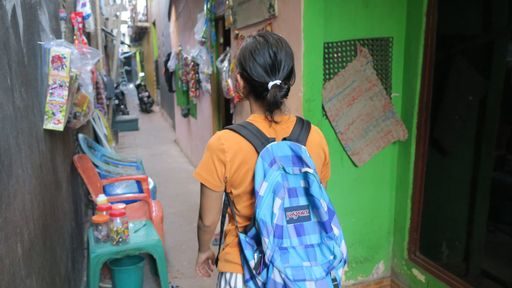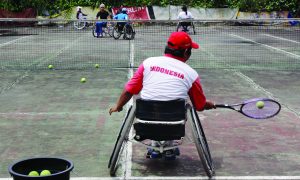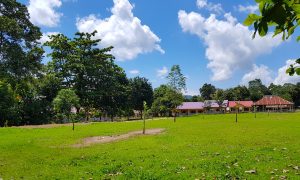Religious conservatives have positioned the family as their ideological battleground. The Family Resilience Bill, introduced to the Parliament in February 2020 by five politicians from several parties, was first introduced in 2017 by a religiously conservative faction. The bill received wide public backlash and parliamentary criticism but has not been withdrawn. Instead, the bill is at the “harmonisation” stage and remains on the list of 50 priority list of bills to be discussed by parliament. The bill both reflects and creates public discourse on the relationship between the state and family; and gendered roles of women and men. How does this emphasis on the family in current policies and political discourse map onto the everyday realities of families already living in poverty and during a pandemic?
Those already experiencing poverty are less able to take necessary measures to protect themselves, while vulnerable groups are in danger of being plunged further into poverty. Projections also indicate the likely emergence of the “new poor”, those groups that had moved out of poverty but remain precarious to shocks. Most notably, there indications of deleterious impacts on women, particularly in regard to domestic and intimate partner violence and time burdens. Given this new context, what is the capacity of families living in poverty to shoulder the burden of “self-reliance” at a time when they are made more vulnerable due to COVID-19?
This is not the first time that a “Family Bill” has been introduced into Parliament since reformasi. In 2009, the SBY government enacted Law No. 52 on Population Growth and Family Development that linked access to a range of services to normative behaviour. Notably, social protection and poverty alleviation programs, of which there are many (including the conditional cash transfers and the Indonesian health card), are directed towards women, but require them to take parenting classes to be eligible. These classes often emphasise gendered social and cultural norms and religious values.
The 2020 Family Resilience Bill goes beyond previous iterations of the Bill in defining state expectations of families, because it locates the responsibility for preventing and resolving social problems firmly within the purview of the family. The academic paper that accompanied the Bill provides a long list of “social ills”, from domestic violence to drug abuse to an increase in “crimes against children”, all of which are attributed to the failure of the family to “manage internal issues”. Women in particular are targeted and the Bill stipulates that wives are responsible for maintaining the household, ensuring the unity of the family, and fulfilling the rights of her husband and children in accordance with religious, social, ethical norms and prevailing laws.
The Bill cites an “urgency” in intervening to “empower family resilience” and protect the sacredness of the family, in order for the state to be able to reduce social problems. “Vulnerable families” are defined as those who do not sufficiently display enough pious religiosity in their lives. But while the Bill expresses concern about both parents working full time, seen as a threat to moral resilience, it also requires the family to be economically self-reliant, and in doing so, eschews the responsibility of the state to create the social and economic conditions that enable families to fulfil their prescribed roles. Women who leave their household for paid employment, for example migrant workers women are considered “not ideal” women.
At the heart of the Family Resilience Bill is the message that the family unit is responsible for its own well-being, and therefore, their own poverty and challenges. This is particularly problematic during the current context of COVID-19 where there are indications that domestic and intimate partner violence and time burdens are on the rise.
A Community Abandoned
Our research on childhood poverty conducted in urban areas of South Sulawesi reveals that the family’s capacity to “develop family-friendly work to increase the family’s prosperity” has been curtailed by the very “progress” that is touted to improve their lives. The land that once provided some level of self-sufficiency to local communities has been consumed by the latest urban development of reclaimed harbourside: Citraland’s Pantai Losari. Access to the sea has been restricted, many families have lost their fishing livelihoods, and some have been relocated into a housing complex. The kampungs that once lined the beach front have been replaced by sanitised modernity: shopping malls, cinemas, pathways for cyclists and walkers. In this middle-class vision, there is no room for the urban poor. As the drive for unfettered development continues, the poor have been pushed to the margins literally and figuratively. As their physical and social space has been reduced, so too has their capacity to improve their lot.
The families who are part of this research described the impacts of lost livelihoods for themselves and their children. Mothers and fathers with primary or, at most, junior high school education, eke out a living in construction or service industries, most commonly at the lowest rung of the employment ladder. Both mothers’ and fathers’ work is shaped by precarity—casualised, demanding night-shifts, and insecure.
Precarious work conditions leave parents with a serious time deficit and erode their capacity to function as a family unit and provide support to their children. The precariousness of their existence precludes any possibility for them to take on responsibility for “developing skills to increase the family’s prosperity”, as advocated by the Family Resilience Bill. Relegated to the margins, they are denied the promise of progress and urban renewal, and have little, or no, chance of earning enough money to enjoy the benefits of development. The cleanliness and order of Pantai Losari is only a few hundred metres, but a social universe, away from high rise social housing complexes, surrounded by street crime and violence. The concrete slabs that were to construct the apartments retain the physical signs of a community abandoned: ground-in dirt and blood stains. A mother resorts to locking her daughters inside for fear of the violence they are exposed to outside their flat. Access to basic services is very low. In another site, women described rushing to a central water source at five o’clock. If they miss this deadline, then their entire family go without water.
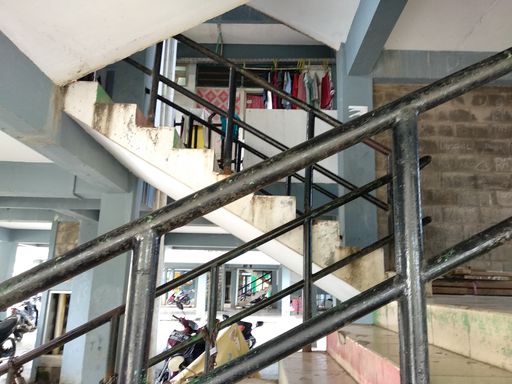
Apartment in Makassar. Image credited to the Assessing Childhood Poverty in Indonesia Team (rights reserved).
Children are often at home by themselves and girls take on a disproportionate burden of housework. “Girls clean, boys play” was a common reality described by many of the girls in our research describing how gender roles play out in their households. Girls also described their lack of safety, whether it is walking on the street or in the school grounds. Girls were too scared to use the school toilets that had no electricity because of the very real fear of sexual assault.
Policy Failure
The policies that could potentially help urban families struggling with precarity, loss of land, absence of services, and deep structural and inter-personal violence have been thwarted by the very political parties that introduced the Family Resilience Bill. For example, The Elimination of Sexual Violence Bill was removed from the Bill priority list in July 2020 after the coalition parties, including PKS, withdrew their support in November 2018. PKS rescinded its support for the bill because it claims the bill is against Pancasila values, and supporting premarital sex and homosexuality.
Another startling example of the erasure of social policy that could help families is the Presidential Regulation that excludes coverage for sexual violence victims and victims of human trafficking in the Indonesian national health insurance scheme. Meanwhile, young girls in poor areas of Makassar continue to live with harassment and assault while walking the streets or using public toilets.
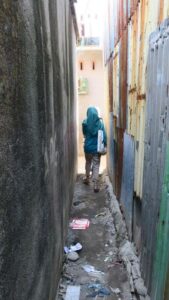
Walking through the streets Makassar, South Sulawesi
Policies driven by religious conservatives and fail to address the real needs of struggling families are not only a feature the national legislative landscape. Many local governments have passed regulations regulating women’s lives and restricting their autonomy. Out of 421 local regulations deemed discriminatory by The National Commission for Violence Against Women (Komnas Perempuan) 333 were aimed at women; they ranged from providing guidance on clothing to imposing curfews and prescribing appropriate behaviour. These limitations add to the burdens of families who are trying to get by on the margins of society. They add to the burden and vulnerability of women whose only means of supporting their families is by working night shifts. In April/May 2020, the National Commission on Violence Against Women (Komisi Nasional Anti Kekerasan Terhadap Perempuan – KOMNAS Perempuan) conducted an on-line survey, ‘Changes in Household Dynamics during COVID-19 in 34 Provinces in Indonesia’, with 2,285 respondents. The survey found that violence against women had increased markedly. Women earning less than Rp 5,000,000 per month, informal workers, those in the 31-40 age cohort, and women in the ten provinces with the highest incidence of COVID-19 experiencing greatest impacts were most severely affected. The survey results indicated increases in both physical and sexual violence.
Poverty reduction efforts in Indonesia need to also tackle issues of shame and social exclusion.
The poor know they’re poor: the roles of shame and stigma in the everyday lives of people in poverty
It is families who are struggling to get by—like those who so generously shared their stories, hopes and fears during our research—that are blamed for creating and perpetuating the nation’s “social ills,” and for being poor. But poor urban families have very little opportunity to improve their lot. Women face additional burdens as a result of regulations and officially-sanctioned attitudes that hinder their ability to support their families and make them more vulnerable to violence, while blaming them for “failure”. The structural issues, including unfettered urban development without adequate social policy and discrimination against women, constrain families’ capacities to function and develop pathways out of poverty.
Conclusion: Taking Responsibility
The narrative of the family as both a self-reliant unit and the conveyor of the nation’s future has been evident over the course of Indonesian history. It has been employed to promote agendas from nationalism to political opportunism. In contemporary Indonesia the disconnection between the narrative of self-reliance that is being institutionalised through laws, and the reality of poor families, has never been greater. The Family Resilience Bill, as an example, does not offer any hope for building resilience but rather undermines it. In the context of the coronavirus pandemic, current approaches to “family resilience” would better serve citizens and the nation through greater understanding of the realities of urban poor. Those realities, pre-COVID-19, were already shaped by poverty, exclusion and violence, both structural and inter-personal. The state, and its political leaders, must recognise their own responsibility, rather than pronouncing the moral injunction to families to take responsibility to “improve their lot”—a weight they cannot possibly bear—particularly as they face increasing precarity and vulnerability due to the pandemic.
Research for this article was carried out as part of the Australian Research Council Discovery Grant, “Suara Anak: Understanding and Assessing Childhood Poverty in Indonesia” conducted at the Children’s Policy Centre, Crawford School of Public Policy, Australian National University.
 Facebook
Facebook  Twitter
Twitter  Soundcloud
Soundcloud  Youtube
Youtube  Rss
Rss 